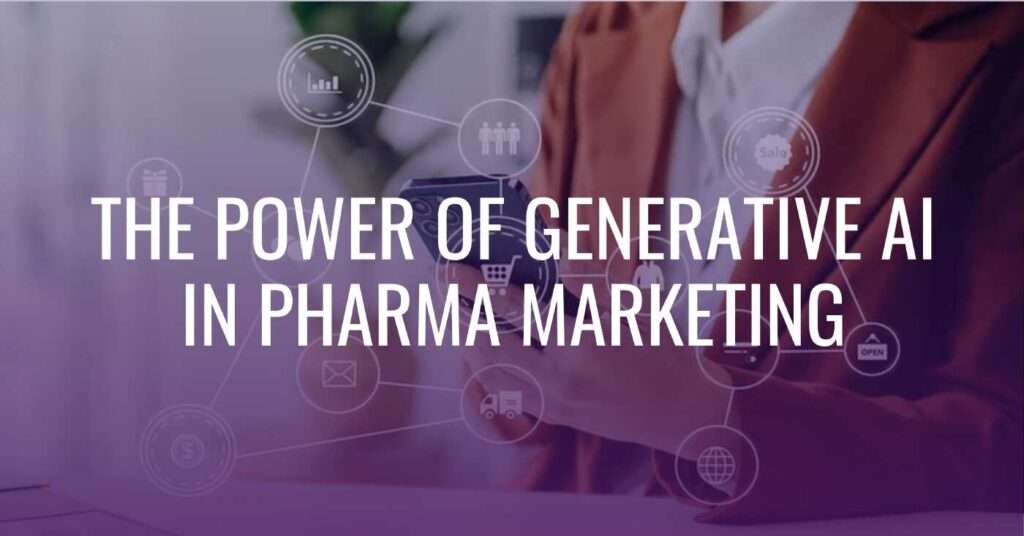The Power of Generative AI in Pharma Marketing

Introduction
The integration of artificial intelligence (AI) in pharmaceutical marketing and sales has ushered in a new era of innovation and efficiency. Among the various AI technologies, Generative AI stands out as a powerful tool for pharma marketers, offering advanced capabilities in content creation, personalization, and data analysis. However, alongside its potential benefits, the responsible use of Generative AI in Pharma demands careful research and scrutiny.
This innovative technology transcends the realm of simply analyzing data and fundamentally altering the landscape of pharma marketing. In this blog, we delve into the landscape surrounding the adoption of Generative AI in pharma marketing, exploring the pros and cons while highlighting the need for responsible practices.
What is Generative AI in Pharma Marketing?
Generative AI is a branch of artificial intelligence that focuses on creating new content rather than analyzing existing data. It uses algorithms to generate original text, images, and even videos. In the context of pharma marketing, Generative AI can be used to develop compelling advertising campaigns, informative content, and personalized messaging.
Generative AI holds significant potential for revolutionizing pharma marketing by empowering companies to produce compelling, relevant, and personalized content at scale. As the technology continues to evolve, we can expect to see its widespread adoption across the pharmaceutical industry, enabling companies to deliver more impactful marketing campaigns and ultimately improve patient outcomes.
Benefits of Generative AI for Pharma:
Personalization and Targeting: Generative AI empowers pharma marketers to deliver highly personalized and targeted content to healthcare professionals (HCPs) and patients. By leveraging Generative AI algorithms, marketers can create tailored messages and campaigns that resonate with specific audiences, enhancing engagement and driving conversion rates.
This approach ensures that patients receive relevant, engaging messages that resonate with their specific needs, ultimately leading to enhanced engagement and improved conversion rates.
Efficiency and Productivity: Generative AI streamlines marketing operations by automating repetitive tasks, optimizing resource allocation, and accelerating decision-making processes. With Generative AI, pharma marketers can achieve greater efficiency and productivity, allowing them to focus on strategic initiatives and innovation.
Furthermore, Generative AI enables seamless integration with existing marketing platforms and workflows, minimizing disruption and maximizing efficiency across the organization.
Data-Driven Insights: Generative AI enables pharma marketers to derive actionable insights from large volumes of data, including patient demographics, treatment outcomes, and market trends. By analyzing these datasets, marketers can make informed decisions, identify emerging opportunities, and optimize marketing strategies for better results.
The pharmaceutical industry is constantly evolving, and companies are always looking for new ways to improve their products and services. Generative AI is a powerful new technology that has the potential to revolutionize the pharmaceutical industry.
Data-Driven Marketing Solutions for Pharma:
The pharma industry operates in a highly regulated and complex environment, demanding targeted and personalized communication strategies to reach the right audience with the right message. Data-driven marketing solutions offer a transformative approach, empowering pharma companies to leverage customer insights and unlock the full potential of their marketing efforts.
Multi-channel patient mapping:
Generative AI can analyze vast amounts of patient data to identify patterns and segment audiences based on demographics, behaviors, and preferences. This allows for the creation of highly targeted and personalized content, such as educational materials, support resources, and medication reminders, that resonate effectively with different patient groups.
Predictive Analytics for Patient Adherence:
Generative AI can analyze patient data to identify factors contributing to non-adherence, such as medication complexity, cost concerns, or side effects. Generative AI can then generate personalized intervention strategies, such as crafting targeted messages, scheduling automated reminders, or designing educational materials tailored to address specific patient challenges.
AI-powered management for HCPs:
Generative AI can analyze HCP data to understand their research interests, prescribing patterns, and preferred communication channels. This allows for personalized content recommendations, such as relevant clinical trial updates, targeted product information, and educational materials tailored to their specific areas of expertise. Additionally, Generative AI can generate personalized meeting agendas and talking points, ensuring efficient and productive interactions with HCPs.
Real-world data analysis for market insights:
Generative AI can analyze vast amounts of real-world data to identify emerging trends, patient needs, and potential areas for drug development. Generative AI can then generate comprehensive reports and summaries, translating complex data into clear and actionable insights for stakeholders, such as market research teams and product development teams.
Chatbots for personalized patient support:
Generative AI can enable chatbots to understand the nuances of natural language, allowing for more natural and engaging interactions with patients. Additionally, Generative AI can personalize chatbot responses based on individual patient data, providing targeted information, support resources, and answers to specific questions. This can improve patient satisfaction and empower them to take a more active role in their health management.
Generative AI is a powerful new technology that has the potential to revolutionize the pharmaceutical industry. By using generative AI, pharmaceutical companies can improve efficiency, accuracy, and creativity in their drug discovery, clinical trial design, and marketing efforts.
Conclusion
The adoption of Generative AI in pharma marketing holds immense potential for driving innovation and efficiency. However, it’s crucial to address concerns around responsible use, including data privacy, bias, transparency, and accountability.
By embracing responsible practices, pharma marketers can harness the full potential of Generative AI while upholding the highest standards of integrity and social responsibility. One of the key benefits of Generative AI in pharma marketing is its ability to generate personalized content at scale.
By analyzing large datasets of patient demographics, medical history, and treatment preferences, Generative AI can create tailored marketing materials that resonate with specific target audiences. Only through responsible use and thoughtful consideration can Generative AI truly fulfill its transformative potential in the Pharma industry.
